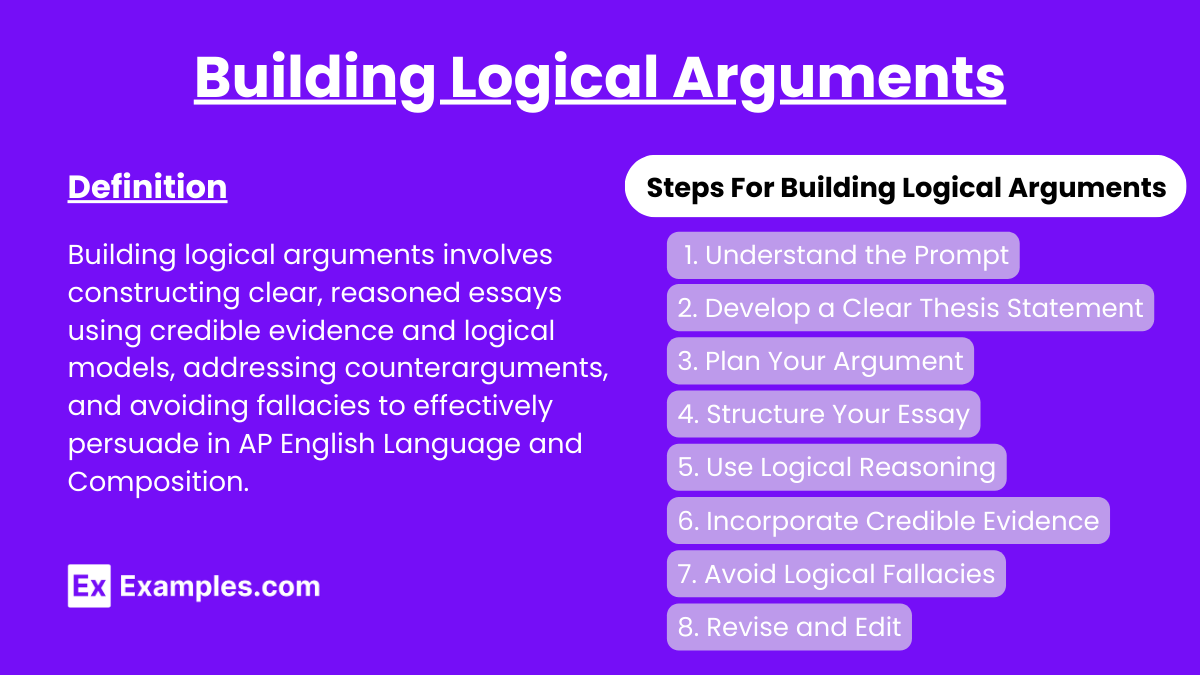In AP English Language and Composition, crafting a logical argument is a fundamental skill necessary for success. This involves constructing clear, coherent, and persuasive essays that effectively communicate your position on a given topics.
Learning Objectives:
Here’s a comprehensive guide to building logical arguments, including key concepts such as logical fallacies, logical models, counterarguments, argumentative speeches, argumentative writings, argumentative essays, and argumentative communication.
Steps for Building Logical Arguments
1. Understand the Prompt
- Read Carefully, Highlight Key Terms
2. Develop a Clear Thesis Statement
- Concise Thesis, Be Specific
3. Plan Your Argument
- Outline, Main Points
4. Structure Your Essay
- Introduction:
- Hook, Background, Thesis
- Body Paragraphs:
- Topic Sentence, Evidence, Analysis, Transitions
- Counterarguments:
- Acknowledge, Refute
- Conclusion:
- Restate Thesis, Summarize Points, Closing Thought
5. Use Logical Reasoning
- Deductive Reasoning, Inductive Reasoning
6. Incorporate Credible Evidence
- Reputable Sources, Relevance, Variety
7. Avoid Logical Fallacies
- Common Fallacies
8. Revise and Edit
- Clarity, Consistency, Proofread
Applying Logical Models
- Toulmin Model: Focus on claim, evidence, warrant, backing, qualifier, and rebuttal.
- Rogerian Model: Address opposing views to find common ground.
Example Structure
Introduction:
- Hook: “In today’s digital age, privacy has become a paramount concern.”
- Background: Discuss the importance of digital privacy.
- Thesis: “To protect individual privacy, governments must implement stricter data protection laws.”
Body Paragraph 1:
- Topic Sentence: “Stricter data protection laws are essential to prevent unauthorized access.”
- Evidence: Statistics on data breaches.
- Analysis: Explain the harm and necessity of laws.
Body Paragraph 2:
- Topic Sentence: “Enhanced data protection laws boost consumer confidence.”
- Evidence: Surveys on trust in services with privacy policies.
- Analysis: Correlation between strong laws and consumer trust.
Counterargument:
- Acknowledge: “Some argue that stricter laws hinder innovation.”
- Refute: “Innovation can thrive with respect to privacy, as seen in GDPR-compliant companies.”
Conclusion:
- Restate Thesis: “Stricter data protection laws are vital for safeguarding privacy.”
- Summarize Points: “Preventing breaches and boosting confidence benefit society.”
- Closing Thought: “Our commitment to privacy must evolve with technology.”
Argumentative Communication
Master argumentative writing and speech to enhance persuasion across various platforms, including essays, speeches, and presentations.
Conclusion
Building logical arguments involves understanding the prompt, crafting a clear thesis, structuring your essay, using logical reasoning, incorporating credible evidence, avoiding fallacies, applying logical models, and revising thoroughly. Mastering these skills will enhance your argumentative communication in AP English Language and Composition.


